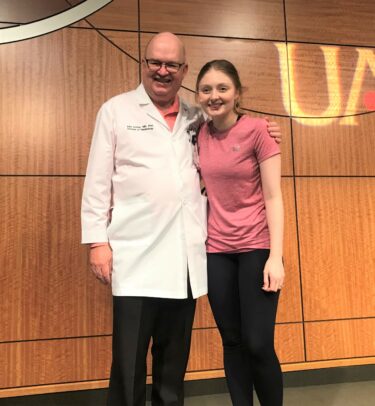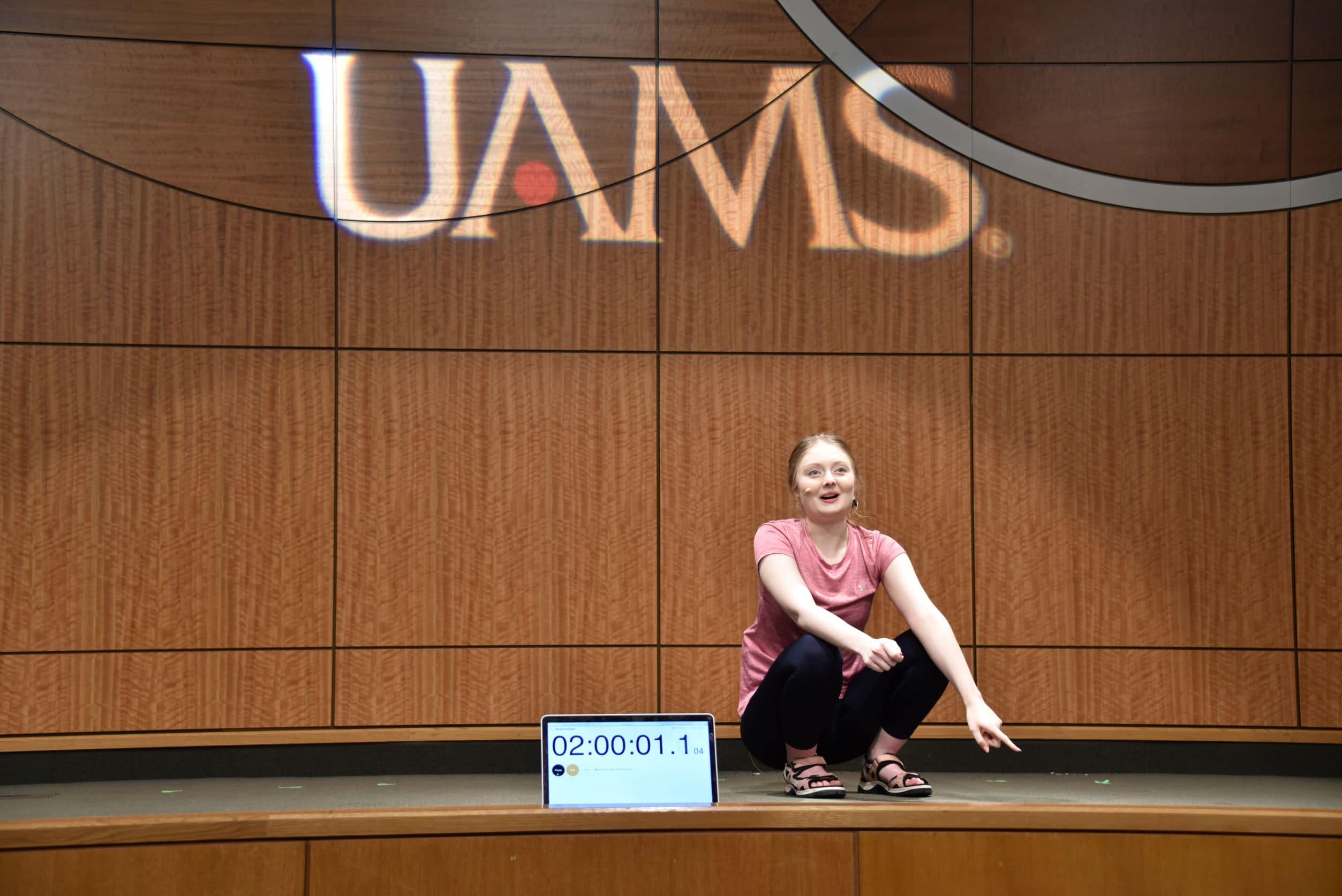North Little Rock Woman Sets Squat Record to Raise Awareness of Nervous System Disorder, UAMS Long-COVID-19 Research
| Some days, Gabby Rushing, 22, struggles with the daily activities of life, but Saturday, Aug. 20, was not one of them. In a triumph over her physical trials, Rushing set a world record at the University of Arkansas for Medical Sciences (UAMS) for the longest time to hold a deep squat.

UAMS’ John Arthur, M.D., Ph.D., poses with Gabby Rushing after she set the world record for longest time to hold a deep squat.
With her feet flat, her hips below her knees and her back straight, the North Little Rock woman squatted for two hours on the stage of the Fred W. Smith Auditorium in the UAMS Jackson T. Stephens Spine & Neurosciences Institute building.
“I just broke the world record, so I’m feeling pretty pumped!” she said afterward.
Her goal with the record attempt, which she named Squats for POTS, was to raise awareness about her chronic condition, Postural Orthostatic Tachycardia Syndrome (POTS). In addition, she hopes her campaign will raise private funding to support POTS-related long-COVID-19 research at UAMS, led by John Arthur, M.D., Ph.D., chief of the Division of Nephrology in the UAMS College of Medicine Department of Internal Medicine and associate director of the UAMS Translational Research Institute.
POTS affects blood circulation and involves the part of the nervous system that controls vital bodily functions such as heart rate, breathing and digestion. People with POTS experience a range of symptoms including dizziness, fainting, heart palpitations, joint pain, weakness and fatigue.
Rushing, who found that squatting helped relieve her symptoms, appeared relaxed as she held the squat during her record attempt. To help pass the time, the aspiring neurosurgeon fielded questions from the audience of family, friends and college mentors, recounting her health challenges since she was 14 and the many ways she has tried to overcome them.
Despite her debilitating condition, Rushing graduated from high school with honors at 16 and graduated magna cum laude at 19 from the University of Central Arkansas.
“Every obstacle is an opportunity,” she said to a question about her approach to life. “I still have some bad days, but I have come so far. My goal is to make every day a good day.”
While she could find no ongoing POTS research in Arkansas, she learned about POTS’ connection to long-COVID-19, and that led her to Arthur’s discovery of a possible cause of long-COVID-19. People with long-COVID-19 may develop symptoms of POTS.
Rushing left a voicemail for Arthur, who was so impressed by it that he called her back immediately.
“She told me her story, and it’s really inspirational for me,” Arthur recalled during his introduction of Rushing on Saturday. “It’s the kind of reason that we’re doing this sort of research.”
Arthur’s team discovered rogue autoantibodies that develop weeks after an initial COVID-19 infection and appear to have a role in long-COVID-19. The autoantibodies were found in Arthur’s preliminary studies to disrupt the normal function of the ACE2 protein, which is key to activating the immune system. The UAMS team’s findings were published in the journal, The Public Library of Science ONE (PLOS ONE).
Arthur’s team will soon send out surveys to about 150,000 Arkansans who have been tested for COVID-19 at UAMS. He will also send it to people who have registered as potential research volunteers at ARresearch.org, sponsored by the UAMS Translational Research Institute.
“Hopefully this will help us figure out what really is the cause of long-COVID-19,” Arthur said.
Arthur’s long-COVID-19 research is supported by the Translational Research Institute’s Clinical and Translational Science Award from the National Center for Advancing Translational Sciences at the National Institutes of Health, grant number UL1 TR003107.
